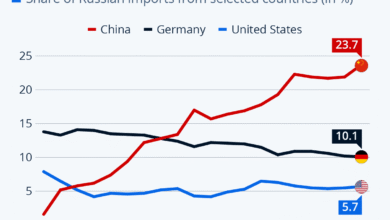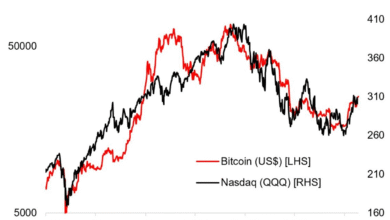Crypto ETF Regulatory Changes: SEC Urged to Favor Innovation

Recent developments in crypto ETF regulatory changes have prompted significant discussions among industry experts and investment firms. As the U.S. Securities and Exchange Commission (SEC) shifts its approach, the implications for crypto market fairness and innovation cannot be understated. Prominent firms, including Vaneck and 21Shares, are advocating for a return to the first-to-file ETF policy to protect smaller investors against market dominance by larger entities. The current ETF approval process, which allows simultaneous product approvals regardless of filing order, has raised concerns about fairness and competitive dynamics in the rapidly evolving cryptocurrency landscape. The urgent call for the SEC to revisit its regulatory framework highlights a pivotal moment for the future of crypto innovation and investor choice within the financial markets.
The landscape of digital asset exchange-traded funds (ETFs) has entered a critical phase as regulatory frameworks evolve and adapt to the growing crypto market. With the SEC facing pressure to modify its procedures for approving these investment vehicles, the balance of power may be shifting between early innovators and established financial behemoths. Stakeholders are increasingly vocal about the need for regulatory reforms that ensure a level playing field, promoting equitable access to market opportunities. The discussions surrounding the recent approval methodologies underscore the urgency of creating a regulatory environment that fosters competition and supports the ambitions of up-and-coming crypto firms. As the SEC navigates this complex terrain, its actions will significantly influence the trajectory of digital finance and investment strategies.
The Importance of the First-to-File Rule in Crypto ETFs
The first-to-file rule has long been a cornerstone of the exchange-traded product (ETP) approval process, serving as a fundamental principle that encourages innovation among crypto ETF issuers. By granting the first application a regulatory advantage, the SEC creates an environment where firms are motivated to develop unique and competitive products. This is especially critical in the rapidly evolving crypto landscape, where technology and market dynamics shift at a breakneck pace. The reinstatement of this rule could not only foster healthy competition but also enhance market fairness for smaller players trying to carve their niche in a space dominated by large established firms.
With prominent asset management companies like Vaneck and 21Shares advocating for the restoration of the first-to-file rule, the discussion highlights the inherent risks involved when the regulatory framework favors late filers. Without this decree, larger firms could strategically watch and replicate successful innovations introduced by smaller companies, undermining the original creators. This shift in regulatory practice poses a threat to the diverse offerings that typically characterize a robust crypto market, thereby diluting investor choice and stifling potential breakthroughs that could otherwise redefine financial assets.
Impact of SEC Crypto ETF Regulatory Changes on Market Competition
Recent regulatory changes by the SEC, particularly regarding the approval of multiple crypto ETFs simultaneously, have raised concerns about fair market practices. Critics argue that this approach disproportionately favors established giants such as Blackrock and Fidelity, allowing them to leverage resources and connections that smaller firms do not possess. By enabling multiple entries at once, the SEC’s decision indirectly weakens the competitive advantage historically enjoyed by the first entrant. This could lead to significant market concentration, stifling innovation and ultimately limiting investor options in a sector meant to embody dynamism and advancement.
As outlined by the executives in their letter to the SEC, the implications of this regulatory shift extend far beyond mere market share. The concentration of power in the hands of a few large firms not only diminishes the entrepreneurial spirit prevalent in the crypto space but also jeopardizes the integrity of the overall market. If fewer players dominate the market, it could lead to reduced competitive pressure, potentially resulting in lower quality products and diminished responsiveness to investor needs. The SEC’s primary objective is to ensure market fairness, and the current trajectory raises fundamental questions about whether this mission is being upheld.
SEC’s Role in Ensuring Crypto Market Fairness
The SEC plays a pivotal role in shaping market dynamics, particularly in an emerging sector such as cryptocurrency. Ensuring fairness in the approval process for crypto ETFs is crucial, as it impacts the competitive landscape that drives innovation and growth. The joint letter from significant industry players underscores a common belief that regulatory practices must evolve to safeguard the interests of all market participants, particularly the smaller firms that often spur advancements. By favoring established names, the SEC risks creating an uneven playing field that dilutes the competitive edge necessary for a thriving crypto market.
The agency’s recent actions have sparked a debate about whether it is prioritizing investor protection over fostering a vigorous market environment. Critics contend that the current ETF approval strategy leads to reduced innovation, as the absence of the first-to-file rule disincentivizes smaller entities from developing unique products. Advocates for reform urge the SEC to refocus on its core mission of promoting a fair marketplace by reinstating filing order regulations, which would ensure all players can fairly compete for investment dollars and attract investor interest in a balanced manner.
The Need for Transparency in the ETF Approval Process
Transparency in the SEC’s ETF approval process is vital for maintaining investor confidence and market integrity. As the crypto industry rapidly evolves, the SEC’s decision-making criteria must be clear and equitable, allowing both new and established firms to understand their regulatory pathways. In light of recent simultaneous approvals, many stakeholders are left questioning the underlying regulatory rationale. A more transparent process could alleviate concerns that the SEC might be fostering an environment where large firms can easily replicate innovations introduced by smaller players, ultimately undermining competition.
A clear and transparent framework would assist companies in navigating the regulatory landscape, facilitating smoother entry into the ETF market for legitimate innovators. By enhancing clarity in how applications are assessed and approved, the SEC can foster an atmosphere of trust among market participants. As a result, more firms would be encouraged to enter the crypto ETF space, providing diverse choices for investors and propelling the industry towards growth. Ensuring transparency can not only help advance crypto innovation but also reinforce the SEC’s commitment to protecting investor interests.
Consequences of Favoring Late Filers in Crypto ETFs
Favoring late filers in the crypto ETF approval process can lead to dire consequences for market innovation and competition. By allowing large firms to take advantage of the first-to-file policy’s erosion, the SEC inadvertently encourages a pattern where smaller firms’ innovations are replicated rather than celebrated. This practice risks creating a culture where the agility and creativity of smaller innovators are suppressed by resource-heavy competitors who can afford to play a waiting game. As mergers and acquisitions become the norm to consolidate market power, the diversity of products offered can significantly diminish.
Moreover, such favoritism can reshape investor trust and sentiment towards the crypto market. Investors typically seek unique investment vehicles that offer a competitive edge, which is often born from the unique insights and initiatives of smaller firms. If the SEC continues to favor late filers, it may drive talented entrepreneurs out of the crypto space altogether, thereby depriving investors of novel opportunities. The essence of a competitive marketplace lies in its agility, and by compromising this, the SEC could inadvertently stifle the evolution of the entire industry.
Reinstating First-to-File Policy: A Path to Market Integrity
Reinstating the first-to-file policy could serve as a corrective measure, restoring balance and integrity to the crypto ETF approval process. Advocates believe that honoring the filing sequence can significantly reinvigorate competition among ETF issuers, ensuring that first movers retain their advantages while also encouraging new firms to innovate and develop unique products. Such a system can rekindle excitement within the market, as firms strive to create the most compelling offerings to attract investor capital, ultimately contributing to a dynamic investment landscape.
Additionally, honoring the first-to-file principle aligns with the SEC’s broader mission of supporting fairness and transparency within financial markets. By reinstating this policy, the SEC can reinforce its commitment to a level playing field, enabling smaller firms to compete effectively against larger entities. This shift could not only rejuvenate the crypto ETF market but also enhance investor protection, as a diverse array of products catering to different risk appetites and investment strategies comes to fruition, thereby ensuring a robust and resilient market.
The Future of Crypto ETFs: Innovation or Market Monopolies?
Looking ahead, the future of crypto ETFs hinges on the regulatory environment established by the SEC. If the agency allows the current trend of favoring late filers to continue, there is a significant risk of creating market monopolies dominated by a few large firms, ultimately stifling innovation and discouraging new entrants. The vibrant nature of the crypto market, often characterized by rapid technological advancements and novel investment solutions, is at stake. The competitive spirit that has defined this sector is crucial for its future growth and legitimacy in the eyes of mainstream investors.
Conversely, if the SEC takes a proactive approach to support innovation through the reimplementation of the first-to-file rule, it could lead to a renaissance in the crypto ETF market. Smaller firms would be empowered to explore new ideas and investment themes, giving rise to differentiated products that attract a wide range of investors. By fostering an environment where innovative solutions can thrive, the SEC can ensure that the crypto market remains vibrant and competitive, benefiting all stakeholders involved.
Investor Choices in a Competitive Crypto ETF Landscape
An equitable and competitive crypto ETF landscape leads to a plethora of choices for investors, which is a crucial element for market health. When smaller firms are empowered through policies like the first-to-file rule, investors gain access to innovative products that cater to diverse risk profiles and investment preferences. This diversity not only enriches the market but also enhances investor education, as individuals begin to engage with a wider array of financial instruments, contributing to overall market participation.
Furthermore, the implications of having varied investment options cannot be overstated. A competitive environment encourages firms to constantly innovate, not only in terms of product offerings but also in fees and service quality. Investors stand to benefit from lower costs and improved transparency as firms vie for their business. Ultimately, the SEC’s decision-making will play a critical role in shaping the choices available to investors and their ability to participate in the growing crypto ecosystem.
Addressing Regulatory Concerns in Crypto ETF Expansion
As the crypto ETF market expands, addressing regulatory concerns is paramount for the SEC to uphold its mission to protect investors and promote fair markets. The need for regulation that nurtures innovation while preventing market manipulation is crucial for maintaining investor confidence. Concerns arise when compliance frameworks disproportionately burden smaller firms, making it challenging for them to compete effectively. This situation calls for a regulatory recalibration to ensure that compliance requirements support rather than hinder market entrants.
The SEC must craft a flexible regulatory approach that evolves alongside the industry while considering the unique characteristics of crypto assets. Fostering dialogue with industry stakeholders can help shape policies that balance innovation and investor protection. By actively engaging with smaller firms and learning from their challenges, the SEC can mitigate regulatory barriers, preserving the integrity of the crypto market while promoting a fair and competitive landscape for all.
Frequently Asked Questions
What are the major SEC crypto ETF rules affecting market fairness?
The SEC crypto ETF rules, particularly regarding the approval of exchange-traded funds (ETFs), are crucial for ensuring market fairness. These regulations dictate how ETFs, especially in the crypto market, are approved and manage competition among issuers. The SEC has recently faced criticism for abandoning the first-to-file rule, enabling simultaneous ETF approvals that potentially disadvantage smaller firms and disrupt fair competition.
How does the first-to-file ETF policy impact crypto market innovation?
The first-to-file ETF policy is vital for fostering crypto market innovation. It ensures that the first firm to submit an ETF application has a competitive advantage, encouraging innovation among smaller issuers. However, the SEC’s shift to simultaneous approvals has been argued to jeopardize this dynamic, allowing larger firms to easily replicate and launch products introduced by trailblazers, thereby diminishing the incentive for innovation.
What procedural changes has the SEC made in the crypto ETF approval process?
The SEC has altered the crypto ETF approval process by allowing simultaneous approvals of multiple ETFs rather than adhering to the traditional first-to-file principle. This change has raised concerns among smaller firms about levels of competition and innovation within the industry, as it could lead to market dominance by larger entities who can afford to follow competitors’ lead.
Why are investment firms urging the SEC to restore the first-to-file rule for crypto ETFs?
Investment firms are urging the SEC to restore the first-to-file rule to maintain a balanced competitive landscape in the crypto ETF market. They believe that reinstating this rule will protect smaller firms’ ability to innovate and compete effectively against bigger companies. Without it, there’s a risk of creating a less dynamic market where major players can easily capitalize on the innovations of smaller issuers.
How do recent SEC actions affect the competitive landscape for crypto ETFs?
Recent SEC actions, particularly the simultaneous approval of numerous crypto ETFs, have significantly altered the competitive landscape. This shift favors larger firms with more resources at their disposal and can stifle innovation from smaller players, thereby risking market fairness. Critics argue that this creates a scenario where competition is less about unique offerings and more about duplicating successful products, ultimately harming investor choice.
What implications do changes in the SEC’s crypto ETF approval process have for investors?
Changes in the SEC’s crypto ETF approval process have substantial implications for investors. A shift to simultaneous approvals can limit the diversity of investment options available. It may lead to fewer unique products as larger firms replicate successful smaller issuers, thereby reducing the overall choice investors have and potentially impacting capital formation in a way that doesn’t support the SEC’s core mission of promoting market fairness.
| Key Point | Details |
|---|---|
| SEC’s Filing Order Rule | The SEC is being urged to reinstate the ‘first-to-file’ rule for crypto ETFs to ensure fairness and innovation. |
| Concerns of Bias | Executives argue that the SEC’s simultaneous approval practice favors larger firms and undermines smaller issuers. |
| Impact on Market | The current approval process may limit competition and market growth, jeopardizing investor choice and innovation. |
| Call to Action | The executives have called for the SEC to return to honoring filing sequences to protect market integrity. |
Summary
Crypto ETF regulatory changes are crucial topics in the financial landscape today. The SEC’s current practice of allowing simultaneous approvals is seen as detrimental to market fairness and innovation, particularly disadvantaging smaller firms. Urged by major industry players, there is a strong call to revert to the ‘first-to-file’ rule to ensure a competitive market. This change could foster an environment that encourages true innovation and provides diverse options for investors, aligning with the SEC’s mission to promote fairness and market integrity.




